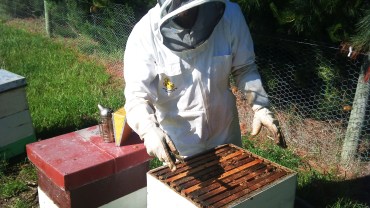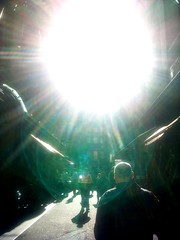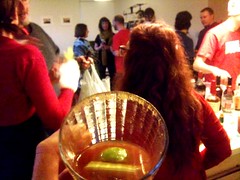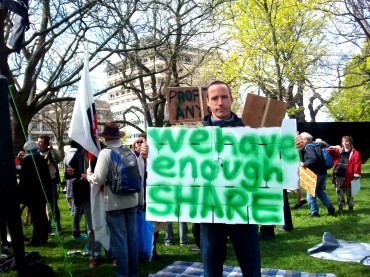Early last week we had a bee swarm settle itself into one of our drain covers. Graham, my mum’s partner, freaked out a bit and called my mum while she was at work, wondering what the hell to do with about five thousand bees swooping and diving around the front of the house.
Fortunately, right across the street and a few doors down we have a friendly local beekeeper named Harvey. Graham buzzed him up and asked him to come over and collect them, which he did with a broad smile.

bzzzzzzzzzzz
Turns out that fresh swarms are useful for beekeepers because the bees in a swarm are usually healthy, and looking for a new home. That means that keepers can combine them with existing hives which may be weakened, especially following winter die-offs, and the combination turns into a win-win situation.
The facts that swarming honey bees have no hive to protect, and have also gorged themselves full of honey before leaving the old hive, means that they are fat, happy, and almost never sting, so you can just pick up a swarm, put it in a box, and move it where you like.
After I’d learned about Graham’s adventure, I decided to go across to Harvey’s place, knock on his door and have a wee chat. I’ve been interested in urban beekeeping for a while now, and this could be an opportunity to learn more.
As it turns out, we are just coming up towards the honey-flow now, which begins in a few weeks. At the moment, the hives are gradually becoming more active, the queens are furiously laying eggs and hatching larvae, and hives are separating and combining all over the landscape. Harvey was happy to take me out this morning to visit the four sites where he has his twenty or so hives so he could check on their health and activity.

"Are you my moommy?"
At 8:00am this morning we began by loading up four hive stacks on to the back of his truck to take out to one of the farms in the area. The air was warm with the promise of summer, and the sky was blue with streaks of white over the northern horizon. It was a perfect day for a little tour around the countryside checking up on beehives.
Farmers and beekeepers have a really cool symbiotic relationship where the bees get to feed themselves, and the farmers get their crops pollinated. Some commercial growers, such as kiwifruit producers, actually pay up to $200 a hive to have bees on their orchards. In a large kiwifruit orchard over two hundred hives could be placed, meaning quite a few dollars for the keepers.
We had a yarn with Dale the farmer about his son’s new dairy farm, then Harvey arranged to visit Dale for a “proper sit down and a cuppa” later in the weekend, and eventually we unloaded the four hives into a space near the front gate next to a stand of gorse. The clover out in the pastures is just starting to come up now, and will begin nectaring in a week or two, just in time for the bees to get really busy.
As I was helping Harvey get the last hive on to the dolly on the flatbed, I got my first sting; I managed to slip the top box open, and after the trip on the back of the truck the bees were feisty. While I was wearing a veil and gloves, I still got a ping on my forearm though my shirt, and instinctively flicked the hive’s valiant defender off. Harvey got me to stand well back, in the open breeze, while he placed the last hive. Thankfully I had very little reaction besides a bit of soreness for about five minutes; reassuring, since it’s been about 15 years since I last got stung.

Harvey: "A beehive is like a single organism."
We left the bees to settle in and headed out to the next site, where we checked for dreaded Varroa mite invasions and added top-boxes called “supers” where the queens can’t enter to lay eggs, so only honey bees can deposit honey in the cells. These top supers are the harvestable portions, and can yield anything between ten to ninety kilograms of honey in one flow season—which is astonishing. That makes for some very busy bees.
After adding a top super on to the four hives here, which each have two brood supers on the bottom, we happened to meet another hobbyist beekeeper who was driving past. After a short chat about what they each do with their honey, the state of Varroa invasions, and (of course) the weather, we travelled on to the next site, down the Waimakariri River Gorge. Here, the farmer was experimenting with an old strain of Crimson Clover, and he and Harvey had decided to place four hives there to see what the honey might be like.

Harvey in the Crimson Clover patch
Finally we went to another farm further down the gorge, and I managed to get stung another five times in short order. Once in the back of my head where my baseball cap fastener opening was exposed and a couple of bees decided to rustle around in my hair; a couple more times on my arms; and, in a fantastic strike, once again just above my right eyebrow. Good targeting, bombardier! (At least I never got stung on the tongue by a wasp hiding in a bottle of beer, as Graham later told me had happened to him…)
We also found another swarm, which we later deposited into the last hive we checked on at another farm. This last hive was significantly weakened after the winter and could obviously use the reinforcements. The swarm had made its way to a gorse branch and would have gone feral if we hadn’t discovered it in time.

About two thousand bees, just hangin' out in the sunshine.

Swarm in a box
Harvey put them in his little suitcase, and off we went. As a final parting gesture, I felt something gently moving under my baseball cap. As I took off the cap and the curious bee buzzed off, I realised that I had literally had a “bee in my bonnet.”
I had a great time out on a sunny day learning about bees. I spent the whole time querying Harvey about everything from the chemical processes of honey production (bees partially digest the nectar, break down the sugars, and dry the honey out to <20% water before capping the honey cells in the comb) to the social dynamics and communication that bees use. They are truly amazing creatures that seem to act as a single organism composed of tens of thousands of coordinated individuals. I found it to be a really connective experience with the elements of my environment; suddenly I was thinking about the kinds of flowers from which bees can draw nectar, how bees are so vital to food production via pollination, and how the many products of the hive—wax, bee pollen, propolis and royal jelly besides the honey itself—benefit we humans.
The day only served to increase my interest in learning how to keep bees (it only takes the investment of a few hours a month to manage the hives), and I also got to hang out with Harvey himself, who is a total dude. He has chickens and a big vege patch out the back of his house, and is as interested as I am in living in ways independent from food prices and reliance on supply companies. We had a solid exchange on this topic, and shared a few simple ideas.
Brilliant.


















